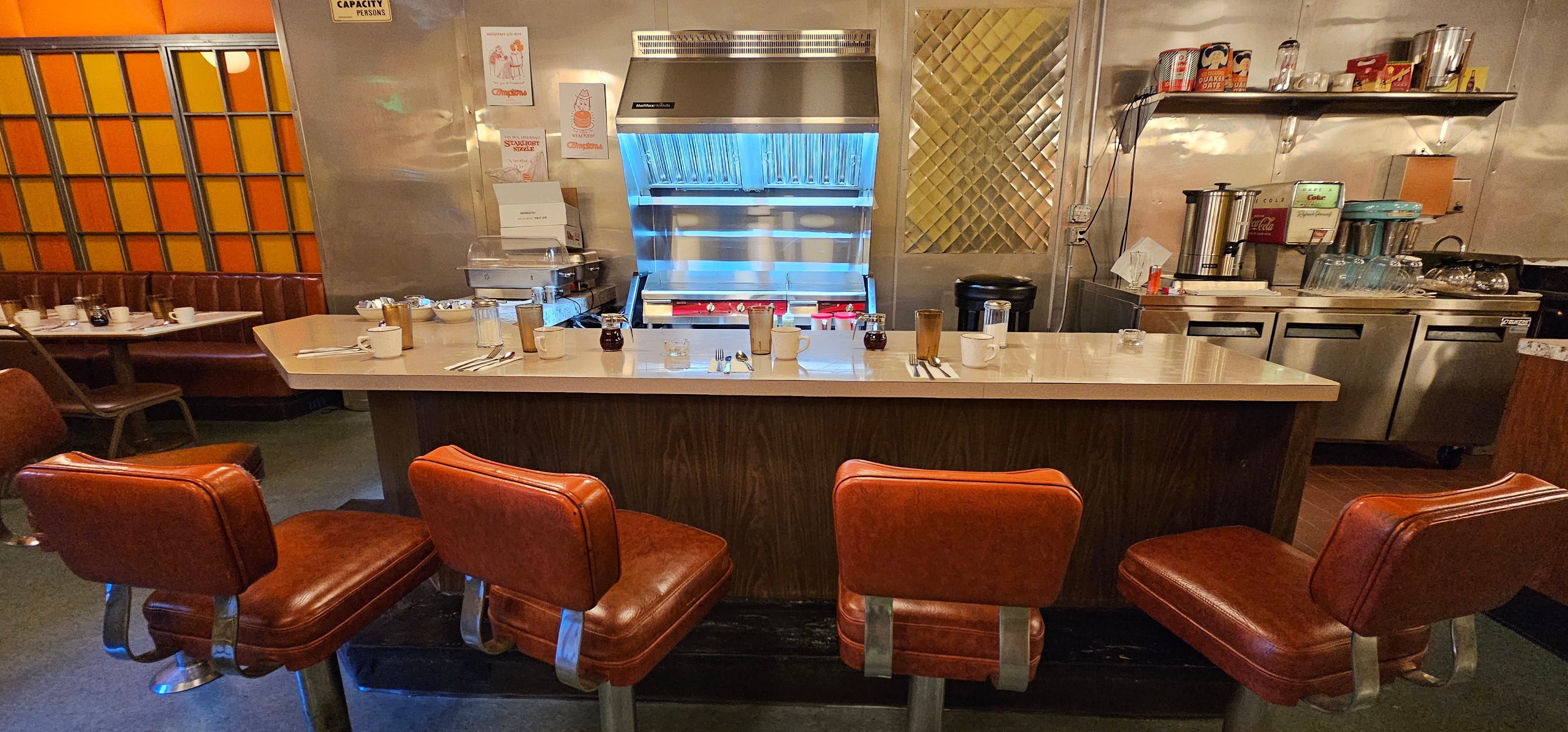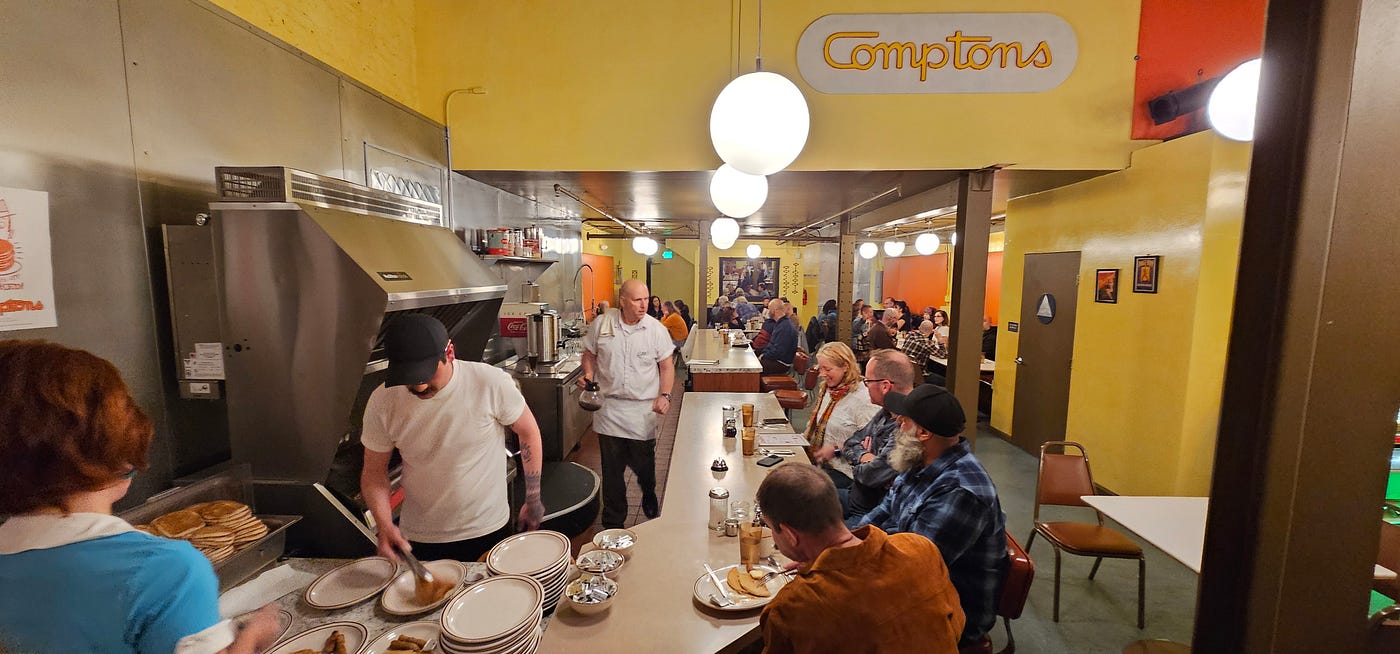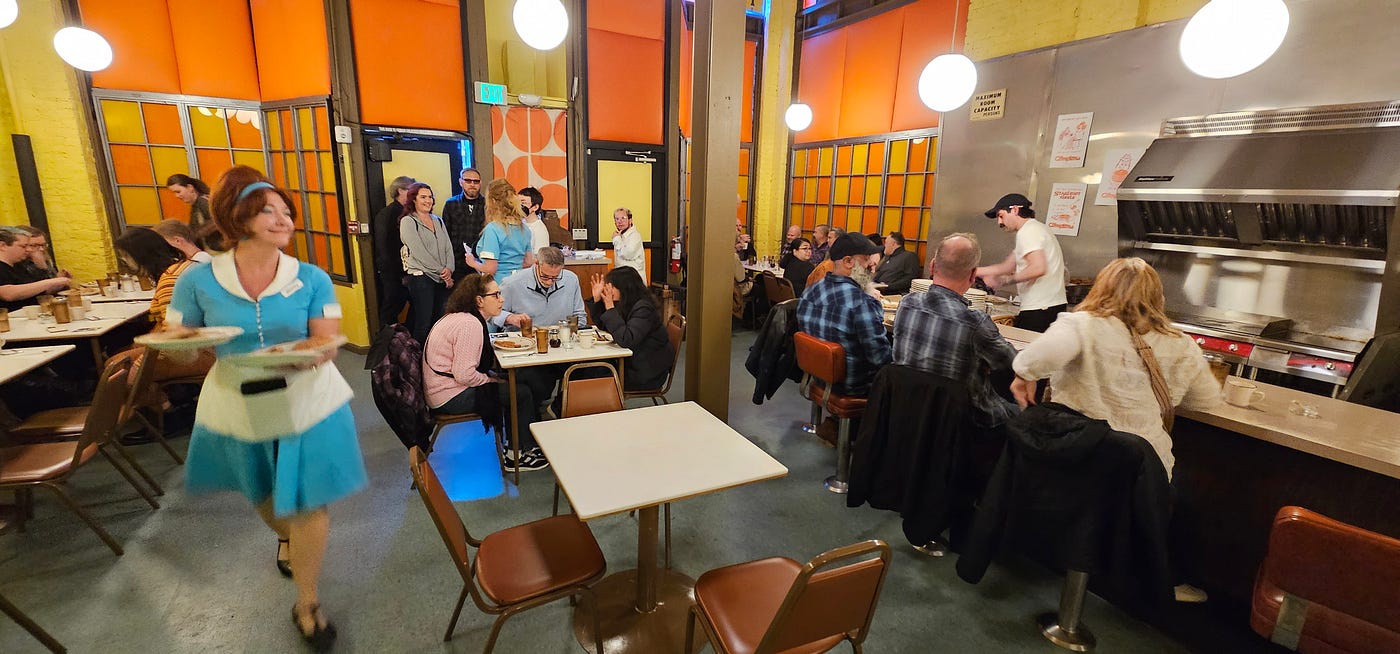‘The Compton’s Cafeteria Riot’ is Serving Up Coffee, Pancakes, and Resistance (The NoPro Review)
Three years before Stonewall, San Francisco’s Tenderloin was home to America’s first LGBTQ uprising.


The Compton’s Cafeteria Riot is not simply a piece of immersive theatre. It’s a defiant, full-bodied act of historical restoration, and it is a living, breathing act of resistance. Staged in the heart of the Tenderloin, the show transports audiences to the San Francisco of 1966, to the fluorescent-lit, linoleum-floored Compton’s cafeteria, where transgender women, drag queens, and queer folk dared to fight back against police harassment in one of the first LGBTQ+ uprisings in US history, three years before the events of Stonewall.
What makes Compton’s so powerful is not just its immersive design (though, yes, the retro set design — with its gritty, lived-in period details — is both convincing and evocative), but rather the emotional current running through every scene. The performances are uniformly magnetic: fiery at times, quiet and aching at others. The tight quarters provide no distance. History unfolds within arm’s distance — coffee cups stay full, while tensions boil over. It is a story of survival and defiance, and it asks audiences — sometimes uncomfortably — to bear witness.
The show’s narration avoids over-explanation, instead offering a subtle emotional through-line from the vantage of historical hindsight. Intercut with drag performances set to catchy 60s tunes, the experience invites us to feel and understand — not just observe — what it meant to exist, survive, and resist in that time and place. The riot itself is not a singular eruption, but rather a culmination of relentless indignities and quiet resilience. The specific details of that pivotal night (the actual date is lost to history) are less important than why they happened.

What makes The Compton’s Cafeteria Riot so affecting is its slow-burn structure. The show takes its time, letting us settle in the rhythms of the cafeteria and the lives of its regulars — laughing with them, watching them flirt, argue, and support one another through a daily gauntlet of indignity and danger. As the hours pass, a steady, nearly invisible pressure begins to mount. Small slights and institutional cruelties — bristling exchanges with management, degrading encounters with police — pile up like kindling. Each character carries visible and invisible wounds, and we feel the rising pressure of exhaustion, anger, and growing solidarity. So when the riot finally breaks out, it’s not a shocking twist. It is an emotional inevitability — a release. The eruption itself is brief and chaotic. It is terrifying. And it is cathartic.
Get Brian Resler’s stories in your inbox
Join Medium for free to get updates from this writer.
SubscribeSubscribe
There’s also surprising nuance in the show’s depiction of the cafeteria’s staff, and particularly its owner, resisting simple vilification and instead revealing people caught in their own systems of fear, complicity, and survival. Meanwhile, the patrons’ relationships are rendered with complexity — fraught with rivalry, self-preservation, loyalty, and the quiet ache of a chosen family in a hostile world.
What makes Compton’s so urgent isn’t just the emotional resonance, but also the political immediacy. In a landscape where anti-trans legislation is surging and queer communities continue to be targeted, this story couldn’t be more relevant. The fact that the Compton’s riot remains largely unknown is no accident. This production refuses that erasure and reclaims a narrative too long buried. It stands tall in fighting back against the systemic erasure of LGBTQ stories and spaces.

And it doesn’t stop there. Compton’s presents history as something alive, urgent, and contested. The spaces where this history was made remain battlegrounds today. The original building that housed Compton’s Cafeteria is now owned by the GEO Group, a private prison corporation operating it as a federal halfway house. Activists continue to fight not just for symbolic recognition, but for tangible control over places like this, as part of the ongoing struggle to establish the Transgender District as a permanent, protected cultural zone.
The Compton’s Cafeteria Riot is both a memorial and a celebration — both remembrance and reclamation. By reminding us of the painful past, it holds a mirror up to our broken present and points purposely toward the work left to do. Compton’s Cafeteria Riot is not just a show; it’s a call to action. And it isn’t just worth seeing — it’s necessary. It is immersive theatre at its most potent — urgent, angry, human, and impossible to forget.
The Compton’s Cafeteria Riot plays weekly at 835 Larkin St. in San Francisco, with shows on Fridays and Saturdays. Tickets are $75.
Discover the latest immersive events, festivals, workshops, and more at our new site EVERYTHING IMMERSIVE, home of NoPro’s show listings.
NoPro is a labor of love made possible by our generous Patreon backers. Join them today and get access to our Newsletter and Discord! You can also GIFT memberships.
In addition to the No Proscenium website and our podcast, and you can find NoPro on Bluesky, Facebook, LinkedIn, YouTube, Instagram, and in the Facebook community also named Everything Immersive.